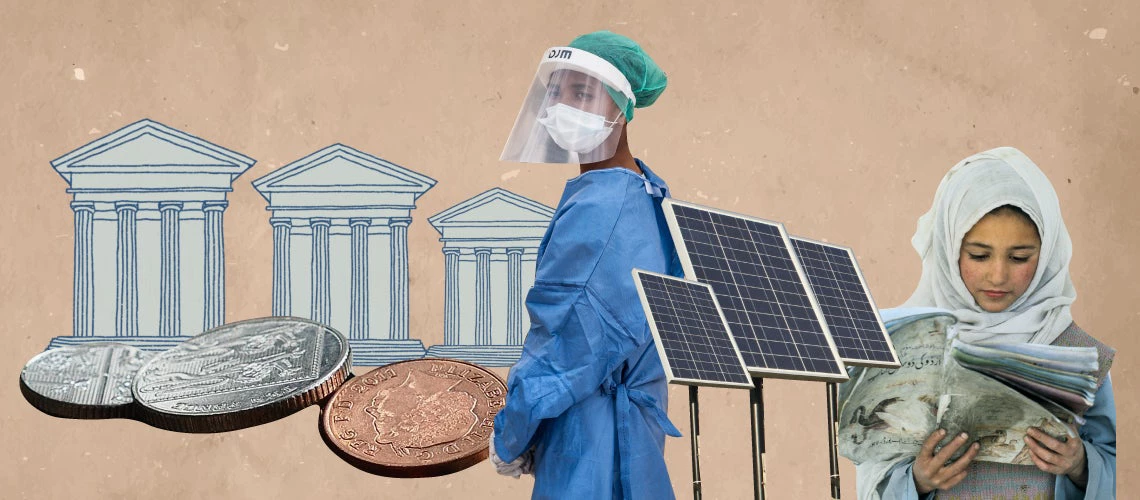 Recent crises from the pandemic and the war on Ukraine, to energy prices and shortages, have caused an increased role of government, more government spending, and more competition with other societal needs for public funding.
Recent crises from the pandemic and the war on Ukraine, to energy prices and shortages, have caused an increased role of government, more government spending, and more competition with other societal needs for public funding.
Governance is about raising resources and putting them to productive and accountable public use. But the recent crises from the pandemic and the war on Ukraine, to energy prices and shortages, have called for an increased role of government, more government spending, and more competition with other societal needs for public funding. It follows from these patterns that societies must continuously improve governance to gather larger resources and face increasing needs.
Defining Governance
Governance was initially defined very broadly as “the traditions and institutions by which authority in a country is exercised.” With time, the definition significantly expanded to include more aspects such as citizen participation, fragility and conflict, inclusivity, climate change, and gender equality. The challenge with such a broad definition is that it is not readily actionable. It is difficult to imagine a project that changes the political process without infringing on democratic self-governance. It is even more difficult to influence informal rules that shape economic behavior.
In this blog, we argue in favor of a narrower and more actionable definition of governance, such as: Governance is the process of raising and managing government revenues in a transparent and accountable way to meet citizens needs for public services . Such needs are defined in a participatory and dynamic manner and their fulfillment is subject to continuous media and civil society scrutiny.
Applications to the Reform Process
A definition that follows raising and spending public money while highlighting the important role of transparency, accountability, and citizen engagement, offers the benefit of improving the process by which resources are raised or spent. This, in turn, can make governance more accountable. We provide examples of governments around the world that have strengthened their governance by improving the processes of taxation, wage bill management and public procurement.
In developing countries, little revenue is raised through traditional taxation as much of economic activity is in the informal economy. New technology such as drones can be used to help expand the tax base by documenting property and levying local property taxes, or by utilizing electronic invoicing systems. For example, Mexico introduced electronic invoicing in 2011 which resulted in an increase in tax revenue collection as a share of GDP, from 9.4 percent in 2010 to 10.4 percent in 2012. In 2004, Georgia expanded the use of e-services, thus simplifying taxpayer requirements and reducing the need for in-person meetings between tax officers and taxpayers. As a result, tax receipts soared from 12 percent to 25 percent of GDP. In the 2000s, Indonesia established several Medium Taxpayer Offices (MTOs), i.e., offices with much higher staff-to-taxpayer ratios, to oversee the tax administration of large corporations in various regions. Assignment to an MTO, as opposed to a traditional Primary Taxpayer Office increased tax revenue significantly — by 128 percent for the firms affected — at a cost of less than 1 percent of the increase in revenues.
One of the two main channels for using public money is contracting through public procurement. Recent reform efforts in this area have focused on creating e-procurement platforms. In the 2000s, Chile digitized its procurement system by introducing ChileCompra. This led to doubling small and medium enterprise participation in public procurement activities, enhancing efficiency, and reaping financial savings of around 3.5 percent or $230 million. The introduction of the Prozorro Platform in Ukraine brought about estimated savings of up to 10 percent of the procurement value. Other countries have successfully focused on capacity building, improving public-private relationships, increasing transparency and fairness, and reducing cost.
The other significant channel for using public money is personnel management in health, education, and security services since the larger share of their budgets are on the public wage bill. Reforms in this field include measures to track existing staff, contain and reduce the number of staff, improve compensation policies, strengthen human resource management, and implement training and capacity building programs. A number of countries, have successfully implemented these reforms, including Albania, Bolivia, Bulgaria, Ethiopia, India and Tanzania.
The definition proposed here – and illustrated by these three examples – allows for governance projects to be positioned within the broader spectrum of development.
One area where this concept can be readily applied is greening the economy. In the transition to the net zero target by 2030, significant public and private money must be spent to restructure whole sectors such as energy, construction, transport, and agriculture. The estimates for funding needs far outweigh the current spending or the pledges that governments have made so far in various fora related to the Paris Agreement. The role of governance in raising and directing green public investment is clear, as is the government’s role in shepherding additional private money.


Join the Conversation